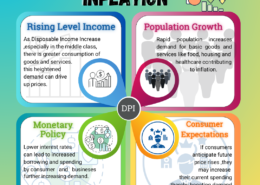Examine the long-term structural causes of India’s ongoing inflationary pressures, including the labor market’s rigidities, some industries’ lack of competition, and supply chain’s overall inefficiencies. Then, evaluate the government’s initiatives to address these root causes.
Model Answer Introduction Addressing persistent high food inflation is essential for ensuring economic stability and maintaining citizens’ standard of living, as recognized under Article 47 of the Indian Constitution. The phenomenon of food inflation in India is multifaceted, influenced by domesticRead more
Model Answer
Introduction
Addressing persistent high food inflation is essential for ensuring economic stability and maintaining citizens’ standard of living, as recognized under Article 47 of the Indian Constitution. The phenomenon of food inflation in India is multifaceted, influenced by domestic production, global market conditions, and government policies.
- Supply Chain Disruptions: Disruptions in transportation, labor, and logistics often result in reduced food availability. For example, the 2010 and 2013 droughts highlighted how adverse climatic conditions disrupted the supply chain, causing price spikes.
- Increased Cost of Production: Rising production costs, such as fuel, wages, and raw materials, inflate food prices. The implementation of the Seventh Pay Commission raised wages, increasing agricultural production costs.
- Global Market Dependency: India relies on imports for commodities like edible oils and pulses, making it vulnerable to global price fluctuations. A spike in global crude oil prices affects the cost of edible oil imports, influencing domestic prices.
- Inflation Expectations: Expectations of rising prices often result in actual price hikes, as observed in consumer behavior. RBI studies show that inflation expectations among households correlate with higher food prices.
- Energy Prices: The deregulation of fuel prices increases transportation costs, further escalating food inflation. The deregulation of diesel prices in 2014 directly impacted the transportation costs of agricultural goods.
- Adverse Weather Conditions: Erratic weather patterns, like weak monsoons or heat waves, affect crop yields and lead to shortages. The weak monsoon of 2023 affected the production of cereals, causing an inflation surge.
- Government Policies on MSP: Minimum Support Price encourages disproportionate cultivation of certain crops, leading to supply-demand imbalances. Heavy MSP support for rice and wheat skews market supply, affecting inflation for other essential crops.
Effectiveness of RBI’s Monetary Policy to Control Food Inflation
The Reserve Bank of India (RBI) employs several strategies to manage inflation, including food inflation:
- Use of Repo Rate: The RBI uses its repo rate as a tool to control inflation by making borrowing costlier, thus reducing demand for goods and services, including food items.
- Inflation-Targeting Framework: The RBI’s inflation-targeting framework (4% ± 2%) provides a structured approach to managing inflation but struggles to meet targets when food inflation rises due to external factors like supply disruptions or global shocks.
- Liquidity Management: The RBI implements liquidity adjustment facilities to manage excess money supply, helping to control demand-pull inflation.
- Focus on Core Inflation: The RBI focuses on core inflation, excluding food and fuel prices, which can enhance its ability to maintain overall price stability.
- Intervention in Exchange Rate Management: The RBI intervenes in the forex market to manage the exchange rate, which can impact the cost of imported food items, especially edible oils and pulses.
- Coordination with Fiscal Policy: Effective control of food inflation requires coordination between RBI’s monetary measures and government fiscal policies, such as subsidies and import duties.
Shortcomings of RBI’s Monetary Policy
Despite these measures, the RBI faces challenges in controlling food inflation:
- Limited Impact on Supply-Side Factors: Food inflation is driven by supply-side issues like weather disruptions and transport costs, which monetary policy can’t address effectively.
- Exclusion of Food from Core Inflation Focus: RBI targets core inflation, excluding food prices, limiting its ability to control volatile food inflation.
- Delayed Policy Impact: Monetary policy takes time to influence the economy, while food inflation reacts quickly to supply shocks.
- Ineffective Against Imported Inflation: Global price changes, like in edible oils, affect Indian food inflation, beyond RBI’s control.
Conclusion
While RBI’s monetary policy helps curb inflation, its effect on food inflation is limited by supply constraints and global factors. A coordinated approach, including fiscal interventions and agricultural reforms, is essential for ensuring food price stability and economic resilience.
See less

India has faced persistent inflationary pressures over the years, which can be attributed to several long-term structural factors: 1. Labor Market Rigidities: The Indian labor market is characterized by rigidities, such as complex labor regulations, limited mobility of workers, and a large informalRead more
India has faced persistent inflationary pressures over the years, which can be attributed to several long-term structural factors:
1. Labor Market Rigidities:
2. Lack of Competition in Certain Sectors:
3. Inefficiencies in the Supply Chain:
4. Dependence on Imports:
5. Structural Bottlenecks in the Agricultural Sector:
Government Efforts to Address Underlying Issues:
The Indian government has undertaken various measures to address the structural factors underlying the country’s persistent inflationary pressures:
1.Labor Market Reforms:
2. Promoting Competition:
3. Supply Chain Modernization:
4. Agricultural Reforms:
5. Monetary Policy and Fiscal Measures:
While these efforts have had some impact, the persistence of inflationary pressures in India suggests that more comprehensive and sustained actions are needed to address the deep-rooted structural issues. Continued focus on labor market reforms, promoting competition, supply chain modernization, and agricultural productivity improvements will be crucial in the long run to enhance the resilience of the Indian economy and mitigate inflationary risks.
See less